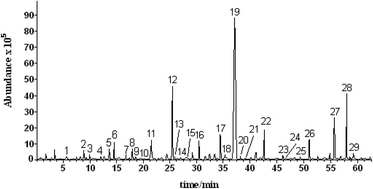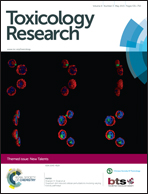Eugenia uniflora leaves essential oil induces toxicity in Drosophila melanogaster: involvement of oxidative stress mechanisms†
Abstract
Eugenia uniflora L. (Myrtaceae family), also known as “pitanga”, is a tree species widely used in popular medicine. Despite the well documented beneficial effects of the extracts and essential oils from this plant, little is known about its toxicity. We performed a phytochemical fingerprinting and evaluated the toxicity induced by the Eugenia uniflora leaves essential oil in a Drosophila melanogaster model. In order to understand the biochemical mechanisms involved in E. uniflora essential oil toxicity, changes in the Nrf2 signaling as well as the hallmarks of oxidative stress were measured. The exposure of adult flies to the essential oil via a fumigant method resulted in increased mortality and locomotor deficits. In parallel, an oxidative stress response signaling, evidenced by changes in ROS production, lipid peroxidation, alterations in the activity of antioxidant enzymes and expression of Nrf2 protein targets occurred. In the light of our findings, attention is drawn to the indiscriminate use of this plant for medicinal purposes. In addition, a potential bio-insecticidal activity of Eugenia uniflora volatile compounds is suggested, a fact that needs to be further explored.

- This article is part of the themed collection: New Talents


 Please wait while we load your content...
Please wait while we load your content...